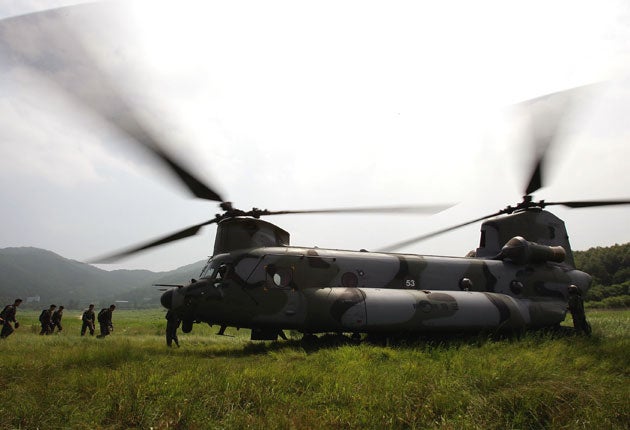Revealed: scandal of UK's grounded helicopter fleet
Chinooks out of service because they are <u>too</u> sophisticated to be deployed

The Ministry of Defence is downgrading the capabilities of eight Chinook helicopters because they are too sophisticated, it emerged yesterday.
Twenty-four thousand separate pieces of wiring are being taken out of every helicopter in the grounded fleet of Chinooks – replacing advanced hybrid digital technology with older analogue – in an attempt to get the aircraft ready for service, the Commons' Defence Select Committee was told.
The Mark3 Chinooks were designed to carry members of special forces and were equipped with the sophisticated technology. However the Ministry of Defence then discovered that this was incompatible with systems in place in the UK and were thus forced to downgrade the specifications in the aircraft while other Western countries were upgrading theirs.
The helicopters, which had already cost the taxpayer an estimated £422m, are now going through the costly and time consuming work at Boscombe Down near Salisbury. Three will be ready to be used later this year, but there will be delay of almost 18 months before the remainder become airworthy.
The news came as The Independent was told that Gordon Brown had agreed to review troop numbers after the Afghan elections next month. Senior defence sources said that the exact numbers would be decided after a the American commander of Nato forces in Afghanistan produces a report on fresh strategy for the war.
Yesterday Gordon Brown refused to be drawn yesterday on how many British helicopters were in service in Afghanistan and whether he had turned down a plea from military chiefs for more troops.
The Prime Minister cited security reasons for refusing to disclose the number of helicopters in Afghanistan, but denied accusations that defence cuts had created a shortage.
He told the Commons liaison committee: "We have spent the right sums of money and we are prepared to do more to ensure our troops are properly equipped."
Mr Brown said there had been a 60 per cent rise in helicopters in the warzone over the past two years, but declined to give actual figures.
The Prime Minister has insisted that it is "absolutely clear" that the heavy death toll in the recent weeks has not been due to the lack of helicopters. But James Arbuthnot, the chairman of the Defence Committee, said: "If commanders had the option of helicopters, that will give them the opportunity to save lives which otherwise would be lost. We say that the lack of helicopters is having adverse consequences, that means less flexibility and in the end it means lives."
Comparing the difference in the numbers of helicopters between the US and UK, Mr Arbuthnot added "When the committee visited Iraq, we had 17 British helicopters operating but the Americans told us they had found 147 helicopters in a hangar which they thought they had lost." The state of the Chinooks was used as an example by MPs in the committee as an example of problems with helicopters which is costing lives of British troops fighting the Taliban, the committee said in a hard hitting report yesterday.
The MPs urged the Ministry of Defence "to stop equivocating" about the capability, capacity and availability of helicopters and increase the number of aircraft as a matter of utmost urgency. Action should not be delayed in waiting for next year's Strategic Defence Review.
Bernard Jenkin, a Conservative member of the Committee, said: "There can be little doubt that we have sustained casualties because commanders have been forced to use land vehicles due to the lack of helicopters."
Lieutenant General Sir Graeme Lamb, Commander Field Army, who has extensive combat experience, told the Committee, said: "If I were a commander in Task Force Helmand, and had another five Chinooks, I would have a chance to manoeuvre in another way."
In tetchy exchanges, the PM repeatedly refused to confirm claims that the Army had asked to send 2,000 more troops to Afghanistan, but was only allowed to commit an extra 700, bringing the total number of UK troops to 9,100. The number is likely to stay unchanged in the near future.
Mr Brown told Mr Arbuthnot: "For the mission we are doing at the moment we have the troops on the ground."
The Prime Minister would only say that a "range of options" had been discussed. Mr Arbuthnot protested: "Forgive me, I am trying to get a 'yes' or 'no'. But Mr Brown again replied that "a variety of options was considered".
Anywhere but Afghanistan: Where British helicopters are stationed
Chinooks
Total 40 in fleet
10 in Helmand
29 in Hampshire
8 to be sent to Helmand
1 being used in an exercise
Pumas
43 in fleet
None in Afghanistan
Merlins
Total 70 in the fleet
None yet in Afghanistan
8 to be sent to Afghanistan
Sea Kings
Total 90 in the fleet
5 in Afghanistan
Apaches
Total 67 in the fleet
8 in Afghanistan
Lynx
Total 176 in the fleet
None in Afghanistan
Gazelles
Total 133 in the fleet
None in Afghanistan
Other
Total 47 in the fleet
None in Afghanistan
Join our commenting forum
Join thought-provoking conversations, follow other Independent readers and see their replies
Comments